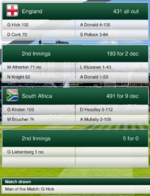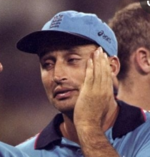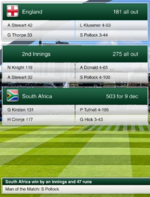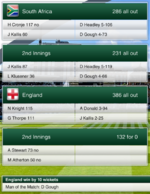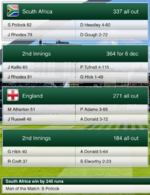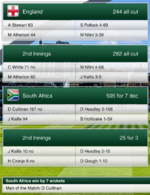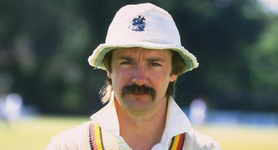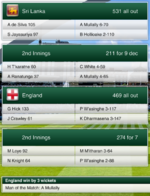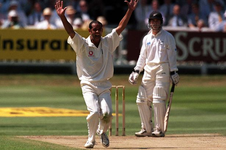West Indies XI
England XI
- - -
England win the toss and choose to bat
- - -
With the series good and done, both teams made wholesale changes to their teams. For England, Ben Hollioake was to be given an opportunity to become familiar with the all-rounder's role at number six, batting ahead of three players making their first appearances of the series: Paul Nixon on Test debut as Jack Russell's hips are given a rest, Dominic Cork and Andy Caddick. Gough and Tufnell both retain their places from the previous game, though there had been rumours that Robert Croft might get the nod as the spinner for this Test. The West Indies meanwhile look a shadow of themselves without Brian Lara: in for him comes Junior Murray to bat at number three in lieu of anyone more specialist to do the job; in the bowling department, both Franklyn Rose and spinner Ramnaraine come into the side, while Ambrose and Walsh continue to play despite the dead rubber.
On a pitch that did not look as flat as usual at the Recreation Ground, Graeme Hick chose to get first use of a wicket that could well age quite poorly. Freed from the responsibility to fight for the series, the English batters were able to play freely - none moreso than Hick himself, who made the most of the platform laid by yet another Atherton-Stewart century stand to assemble a free-flowing innings of 135. Also impressive were Nick Knight (93) and the aforementioned openers, who made 42 (Atherton) and 61 (Stewart) respectively. The one glaring disappointment for England will be that they managed to turn an impregnable position of strength at 327 for two (and later 353 for three) into a less than stellar 383 all out. Hollioake looked as if number six might be a position or two too high for him at this stage in his career, while Nixon and the tail-enders just fell away after he was dismissed. The main benefactor of this collapse was Curtly Ambrose, who picked up three cheap scalps to turn around a spell that had hitherto been wicketless.
So how would the increasingly makeshift West Indian batting fare against the second-string English bowlers? Not especially well is the pretty obvious answer. The pace of Gough and the movement of Caddick and Cork was entirely overwhelming for all but two of the West Indian batting order: Chanderpaul (57) and Hooper (54 not out) were alone in demonstrating their Test quality. Cork gratefully accepted his maiden Test five-for, claiming the wickets of Murray (21), Chanderpaul (57), Holder (6), Williams (0) and Ramnarine (13). There really isn't much to note about this innings, although Paul Nixon will be grateful to have finished his first stint behind the stumps at this level with one catch (Philo Wallace), no drops and no byes conceded. The West Indian total was almost exactly half of England's: 192 all out, a deficit of 191.
With more than half of the Test still to go, there was plenty of time for England to bat again. And despite the increasingly difficult conditions, Graeme Hick was the star yet again: Alec Stewart (69) and Nick Knight (40) both completed the Test match with their second good contribution each, but both were left in the shade by Captain Hick's second century of the game. He rode out the often difficult conditions to make it all the way to exactly 100 not out, whereupon he immediately declared the innings closed. With him by that point was Ben Hollioake, who managed to compile a confidence-boosting 37 not out for his trouble. Ambrose and Walsh, meanwhile, will be feeling the pain of bowling dozens more overs while Hick added yet another Test century as England captain.
The England bowlers had five sessions in which to do their work, 462 runs to play with, and a worn out pitch to bowl on. It's the sort of situation bowlers dream of, regardless of who's taking strike against them. Almost every England bowler filled their boots: Andy Caddick claimed the early wickets of Philo Wallace and Carl Hooper, Darren Gough picked up Clayton Lambert and Junior Murray, while Dominic Cork added another four scalps to his match tally in the form of Holder, Williams, Rose and Ambrose. So keen was Hick to ensure that Cork picked up his second bag of five that he removed Tufnell from the attack and replaced him with himself - only for Walsh to drag a wide delivery onto his stumps for the captain's first Test wicket in years.
Regardless, it completed a four-nil drubbing that could have been entirely different if the first couple of Tests hadn't gone England's way. It really is the way that when a team makes a habit of winning it becomes very hard to stop them from doing that.
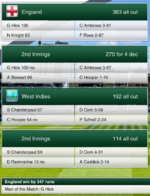
I'm also adding a Player of the Season award in the style of the Allan Border Medal - the Barrington Medal.
Standings
1. Graeme Hick - 8 points (+5)
=. Graham Thorpe - 8 points
3. Alec Stewart - 6 points (+1)
4. Darren Gough - 5 points
=. Ben Hollioake - 5 points
=. Jack Russell - 5 points
7. Michael Atherton - 3 points
=. Dominic Cork - 3 points (+3)
9. Nick Knight - 2 points (+2)
=. Phil Tufnell - 2 points
11. Robert Croft - 1 point
=. Dean Headley - 1 point
=. Alan Mullally - 1 point
Drawn or lost match
Best player - 3 points
2nd best player - 2 points
3rd best player - 1 point
Won match
Best player - 5 points
2nd best player - 3 points
3rd best player - 2 points
4th best player - 1 point
Best player - 3 points
2nd best player - 2 points
3rd best player - 1 point
Won match
Best player - 5 points
2nd best player - 3 points
3rd best player - 2 points
4th best player - 1 point
Standings
1. Graeme Hick - 8 points (+5)
=. Graham Thorpe - 8 points
3. Alec Stewart - 6 points (+1)
4. Darren Gough - 5 points
=. Ben Hollioake - 5 points
=. Jack Russell - 5 points
7. Michael Atherton - 3 points
=. Dominic Cork - 3 points (+3)
9. Nick Knight - 2 points (+2)
=. Phil Tufnell - 2 points
11. Robert Croft - 1 point
=. Dean Headley - 1 point
=. Alan Mullally - 1 point







